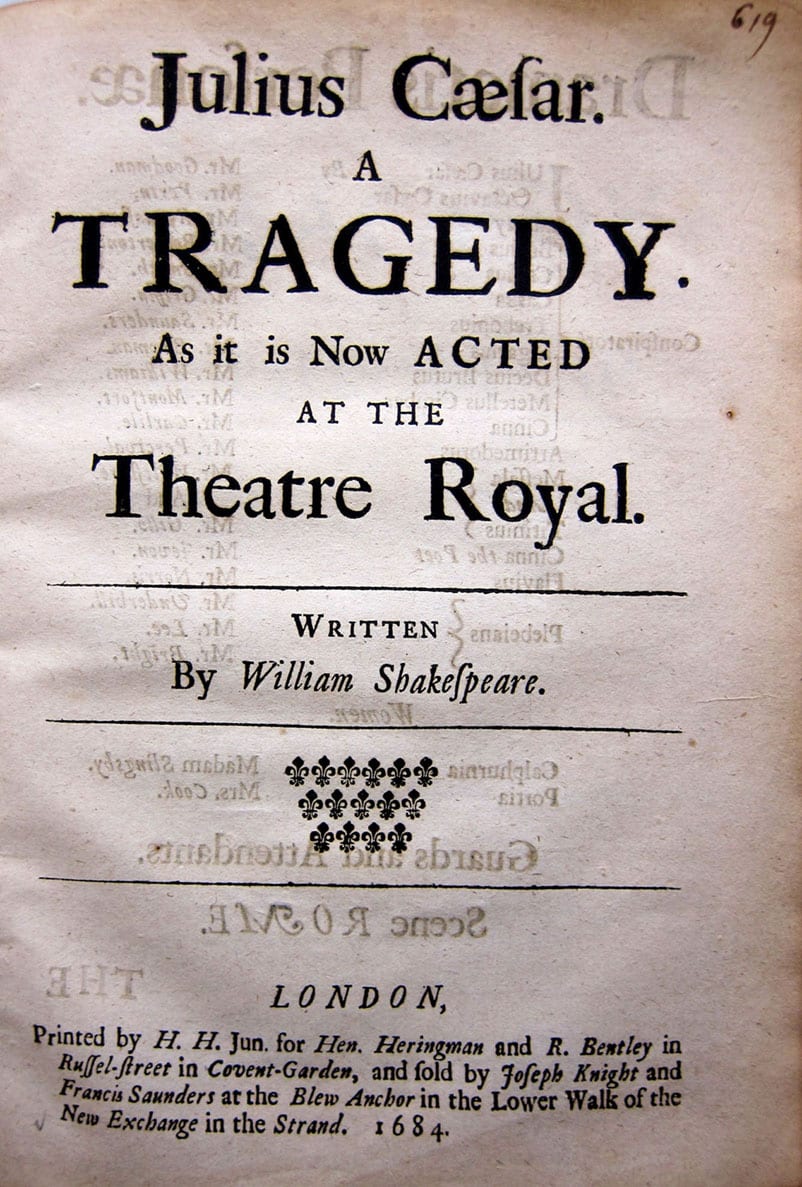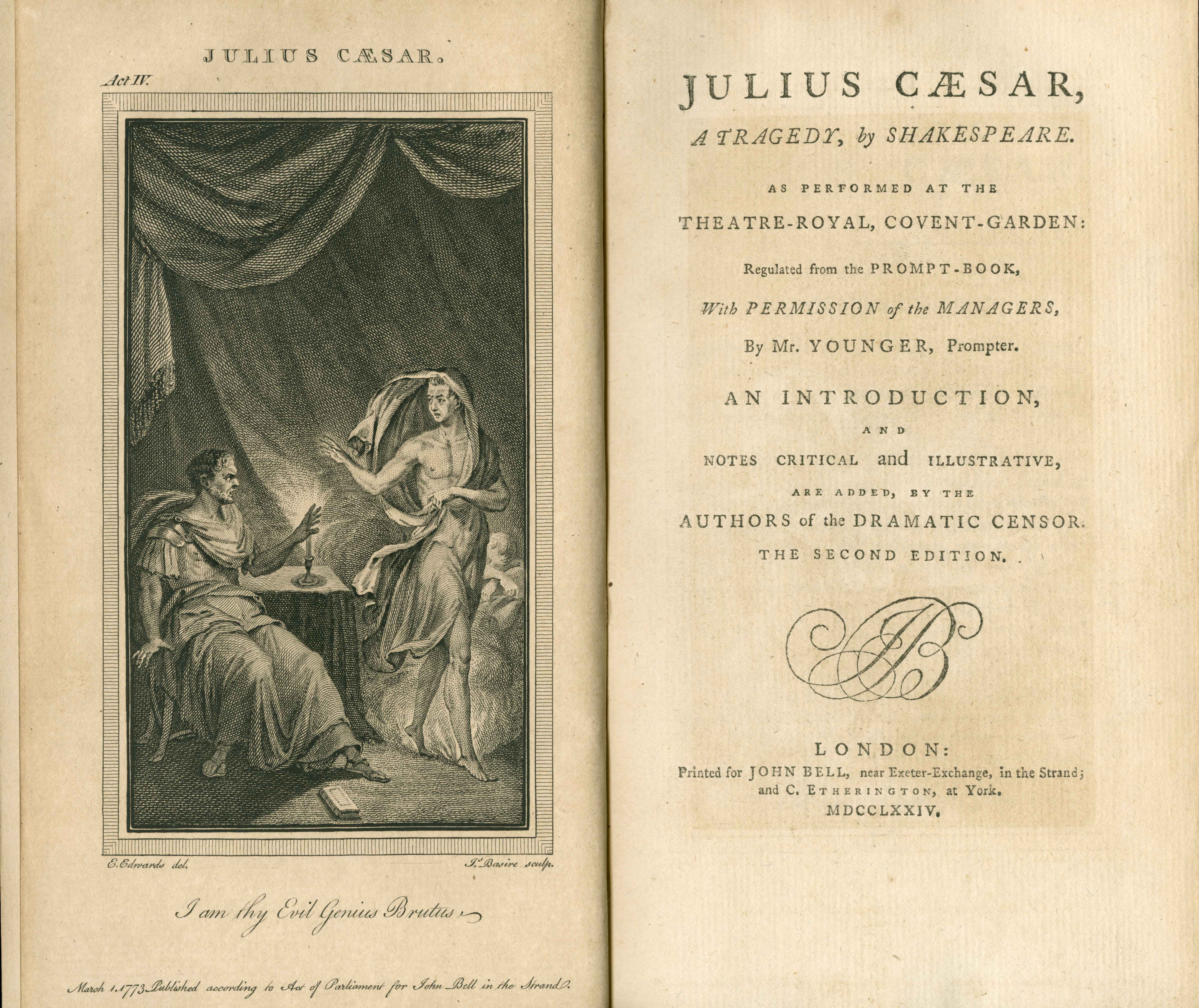Julius Caesar by William Shakespeare is a tragedy that sets forth in Rome around 44 B.C. As all Shakespearean tragedies, Julius Caesar includes a tragic hero whose predetermined fate and hamartia bring about his downfall and in doing so, bring catharsis and poetic justice to the reader. In this tragedy, the tragic hero is Marcus Brutus who’s characterized by his tragic flaw of humility as well as loyalty to the people of Rome.
Throughout the play, Brutus and Cassius conspire against Caesar and then kill him in order to preserve the Republic. Through Caesar, Brutus, and Cassius, Shakespeare is able to convey the theme of ambition vs. humility and how both ends of the spectrum can affect a man’s governing.
In the play, the three main characters, or protagonists, are Caesar, Brutus, and Cassius. In relation to the tragedy, Caesar is the antagonist, displaying contradictory values to that of Brutus. Caesar can be characterized as ambitious and prideful, it’s his ambition that threatens Brutus’ ideals and it is his pride that plays a significant role in his downfall.
He is contrasted in the play as neglecting advice, while Brutus is consenting to it. In addition to that, Brutus is also a very humble and pliable character, whose actions are determined by his loyalty to the republic.
On the other hand, Cassius, Brutus’ adversary, tries to mask his true intentions of taking over Rome by deluding Brutus into thinking he shares the same loyalty to the republic. Eventually, this triad of characters, although personalities completely dissimilar, will come to share the same fate.
The play is set after General Julius Caesar comes back from his successful military campaigns and has conquered the world for Rome. The people of Rome feel so indebted to him that they offer Caesar the crown, although he turns it down, there is still much speculation coming from his peers whether Caesar is becoming “too” powerful.
This is demonstrated by Brutus in the first act when he says, “…I do fear the people/ Choose Caesar for their King. / If it aught toward the general good, / Set honor in one eye and death I’ th’ other”, indeed Brutus makes it his civic duty to protect the people from Caesar’s ruling (1.2.85-93). Brutus’ loyalty for Caesar already wavering, Cassius comes in and further exacerbates the idea that measures must be taken into their own hands to stop Caesar. Once Brutus is convinced, the plan is set in motion.
Caesar is even warned of the upcoming events by the soothsayer, but since his pride transcends his senses he does not listen to the soothsayer and plays right into his fate. The series of events that follow the conspiracy alternate between Brutus’ inner conflict with the plan and Caesar’s inability to listen to advice. In this case, Brutus’ guilt starts to take a toll on him, so much that even his wife begins to notice. Portia goes so far as to ask him in act two when she says, “Is Brutus sick? And is it physical/ to walk unbraced and suck up the humors/ of the dank morning?…/ You have some sick offense within your mind,” (2.1.281-288).
This scene is a demonstration of Brutus’ inner conflict and how he struggles to come to terms with his decision to uphold his values instead of his friendship. This guilt and conflict will also play a major role in Brutus’ downfall and in the play’s resolution.
Although there is some obscurity as to whether Caesar will die, alas Caesar is killed by his comrades. The first to stab him is Brutus, and once Caesar realizes this his sense of betrayal is heightened, as seen when he responds with “Et tu, Brute?-“ (3.1.85). The same kind of response is evoked from Antony when he realizes what Brutus has done.
His loyalty to Caesar is what sets the stage for the resolution of the play, specifically his speech to the people of Rome. In his speech, Antony is able to sway the people of Rome into questioning the conspirators and their real motivation behind assassinating Caesar. It is then the peoples’ decision to drive out Brutus and Cassius, and it is Antony and Octavius’ decision to go to war with them. The last scene of the play includes the battles fought by both sides and the deteriorating relationship between Brutus and Cassius.
At the end of the play, there is a misinterpretation made that leads Cassius to believe that Brutus is dead and his best friend taken prisoner. The toll taken on Cassius is so much that he chooses to kill himself. In view of that, Brutus actually alive, decides to give in to his guilt and kill himself. Finally, the play ends and the reader has reached his or her catharsis when seeing how Brutus’ guilt has ultimately driven him to his death.
At the end of the play, there is also some extent of poetic justice, after all the good has won some victory over the bad. Caesar’s death was avenged and the Republic was preserved, so although tragic there ending can still be bittersweet.
Shakespeare’s use of literary elements throughout the play makes it easier to understand and follow through with the course of events. His use of dramatic irony, foreshadowing, and omens also tie into major events of the plot. For example, the dramatic irony allows for there to be a greater emphasis on the thematic concepts of treason and betrayal, demonstrated in a scene
where Caesar says, “Good friends, go in and taste some wine with me, / And we, like friends, will straight away go together.” In this scene, it is only Caesar in the room who is unaware of the conspiracy and therefore bliss to the ignorance. (2.2.134-135). Likewise, the foreshadowing in the play helps to escalate the climax, one of the most evident foreshadows is when the soothsayer warns Caesar.
The prophecy reads “Beware the Ides of March” and this enlarges the idea that the conspiracy will come to serve by giving the reader an anticipated date to the climax. Similarly, the omens in the play demonstrate the meaning that although the decision is inevitable it is also unacceptable.
The world seems to be in opposition when Casca describes the atmosphere, “Are not you moved, when all the sway of the earth/ Shakes like a thing unfirm?/ Either there is a civil strife in heaven,/ Or else the world, too saucy with the gods,/ Incenses them to send destruction.” (1.3.3-13).
At this level, all the literary elements tie into the major plot of Caesar’s conspiracy, this used not only helps with the readers’ understanding of the text but also augments the climax and the resolution.
Altogether, Shakespeare is able to take a renowned event in history and turn it into a tragedy that conveyed meaning and advisement. Shakespeare uses the event to advise that ambition is great only to an extent, but afterward becomes destructive to the persona.
Works Cited
Shakespeare, William, Barbara A. Mowat, and Paul Werstine. The Tragedy of Julius Caesar. New York: Washington Square, 1992. Print.


